
Donning Catherine Bagnall's costumes for the 'Becoming Penguin' walk are fourth year fashion students Jacob Coutie, Jordie Agnew and Hannah Tate.
Using theatre to turn people into penguins is a symbolic way to highlight some of the planet’s most vulnerable species in this year’s global Still Waving: Climate Change Theatre Action events in Wellington.
Co-organiser Massey University’s Associate Professor Elspeth Tilley says Massey a number of staff and students will become “human penguins” on stage and in the streets of Wellington this Labour Weekend. They are showcasing how artists and performers can respond to environmental and social issues – in this case, the serious threat of global warming to the existence of Antarctica’s penguin populations.
Her new play, The Penguins, is being performed in 14 locations worldwide from Paris to Shanghai and the United States, as well as at Massey’s Wellington campus on Labour Day (October 23). It is one of nine short plays on climate change featured at this year’s Still Waving: Climate Change Theatre Action event at Massey – part of a six-week global movement to highlight climate change issues through performance.
In a thematic prelude, participants will take to the streets of central Wellington in the “Becoming Penguin” performance walk, starting at the Cenotaph at Parliament at 1pm and heading to Massey University. Participants (everyone welcome) are invited to join the walk wearing whatever black and white items they have in their wardrobe that lend a penguin “look”.
Creator of “Becoming Penguin”, Massey lecturer in the School of Design | Ngā Pae Māhutonga, Catherine Bagnall, is an artist whose work focuses on the edges of fashion studies and its intersection with performance practices.
“In the context of questions about humanity’s relationship to the planetary ecosystem and how we categorise ‘other’ species, ‘Becoming Penguin’ explores ideas about the end of the Anthropocene and the beginning of the post-human world,” Ms Bagnall says.
The walk, she says, is to “symbolise support for all the communities taking personal responsibility for climate action at a local level, when governments won’t.”
World premieres staged
Following the “Becoming Penguin” walk, a cast of 23 – including well-known Wellington professional actors alongside Massey students and staff – will stage nine climate action plays by writers of Jamaican, Portuguese, Native American, Australian, New Zealand, Samoan, Canadian and US descent at the campus Theatre Laboratory from 2pm.
“The programme includes two world premieres – a short play by Samoan writer/director Ian Lesā about Pacific Island climate change issues, and one by Kat Laveaux, a playwright from the Lakota tribe in the United States, who visited Massey University earlier this year as part of the National Expedition and Internship Programme, and became keen to participate in Climate Change Theatre Action,” says Dr Tilley.
Also featuring is work by another School of English and Media Studies playwright, Philip Braithwaite, whose short play “Swing Among the Stars”, about colonising Mars, is scheduled for nine Climate Change Theatre Action performances globally.
In her play, Dr Tilley explores human behaviour and attitudes from another species’ perspective (one in which the males ‘stay home’ and look after the young) to provide an innovative and often hilarious framework into which serious ideas can be woven.
“It’s also a way of giving people hope. Penguins have been around for 60 million years, whereas humans have been on the planet for about two million years,” she says. “I think it’s important not to hit people in the face with a message.”
Art and creativity on social issues
Dr Tilley, a lecturer in theatre studies in the School of English and Media Studies – including the Creativity in the Community paper (in which students apply skills in theatre, performance, film-making, creative writing, media practice or mixed media to developing a creative response to a social issue or community need) – is the author of several award-winning plays on climate change and social issues, and producer of the biennial Aotearoa Climate Change Theatre Action events, launched in 2015.
She says the process of creating and performing theatre about a difficult and daunting topic can be empowering for participants and audiences.
“People get bombarded with information about climate change and the doom-filled scenarios – the result is that people become complacent and switch off,” she says. “The performances in Still Waving will entertain, console and confront you with works that are humorous and intense, problem-illuminating and solution-focused, powerful, sometimes funny, sometimes catastrophic, often moving and inspirational.”
All proceeds from the Still Waving event go to youth-led climate action group Generation Zero, which is campaigning for a zero carbon New Zealand economy.
For more information, check out the Still Waving: Climate Change Theatre Action Facebook page.